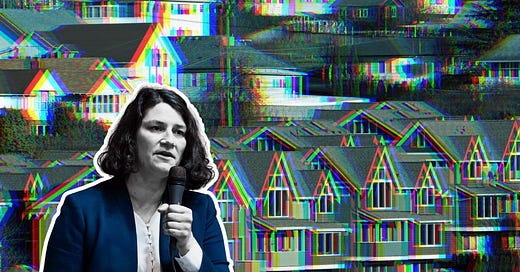Washington lawmakers push statewide rent control—because making the housing crisis worse is their specialty
If you thought rent was high now, just wait until the state starts micromanaging prices.
Washington Democrats are pushing House Bill 1217, a bill that would impose rent control statewide, limiting how much landlords can increase rent each year.
Supporters claim this will help struggling renters, but in reality, it will make Washington’s housing crisis even worse by discouraging new construction, driving landlords out of the market, and ultimately reducing the supply of affordable housing.
If HB 1217 passes, expect:
Fewer available rental units as landlords sell off properties.
Higher move-in costs as landlords raise security deposits and fees to compensate.
Worse housing conditions as property owners cut back on maintenance.
Rent control has failed everywhere it has been tried—yet Washington lawmakers are determined to repeat the same mistakes.
What HB 1217 does
HB 1217 would:
Cap rent increases at 7% per year statewide unless the unit meets certain exemptions.
Restrict landlords from charging move-in fees and deposits beyond certain state-approved limits.
Allow tenants to break leases early without penalty if the landlord raises rent beyond the state-imposed cap.
Give the Attorney General new enforcement powers over landlord-tenant disputes.
Instead of making housing more affordable, this bill inserts the state into private contracts, discourages investment in rental housing, and makes it harder for property owners to cover costs.
Why this bill is dangerous
It will reduce the supply of rental housing
Rent control always leads to fewer rental units because:
Landlords exit the market. If they can’t adjust rents to keep up with costs, they’ll sell their properties instead.
Developers stop building new apartments. Why build in Washington when other states allow the market to function?
Existing properties fall into disrepair. With limited revenue, landlords cut back on maintenance and upgrades.
This has happened in every city that has tried rent control, from New York to San Francisco to St. Paul, Minnesota—where a similar policy caused a 60% drop in new housing permits in just one year.
It will drive up move-in costs
If landlords can’t raise rent as needed, they’ll find other ways to offset the risk.
Higher security deposits and move-in fees. Landlords will frontload costs since they can’t adjust rent later.
Stricter tenant requirements. Expect higher credit score requirements and fewer rental options for lower-income applicants.
More evictions for minor infractions. If landlords can’t raise rent, they may push out tenants for minor lease violations instead.
It won’t make housing more affordable
The real cause of Washington’s housing crisis is not enough supply. Rent control does nothing to fix that.
Instead of encouraging new construction, this bill discourages investment in rental housing.
Instead of making more units available, it will push landlords to sell properties or convert them into short-term rentals.
Instead of helping renters, it will make finding an apartment even harder.
In the long run, this bill hurts the very people it claims to help.
Who benefits from this bill?
Politicians looking for easy votes—it’s easier to pass rent control than to fix the real housing crisis.
Government bureaucrats—more state control means more jobs enforcing new housing regulations.
Wealthy homeowners—with fewer rentals available, home values will rise even further.
Who doesn’t benefit?
Renters, who will struggle to find available housing.
Small landlords, who will be squeezed out of the market.
Future tenants, who will face higher costs and fewer options.
This bill is a political gimmick, not a real solution.
What’s next?
If HB 1217 passes, expect:
Fewer available apartments and longer waitlists.
More landlords selling off properties, leading to higher home prices.
Declining housing quality as maintenance budgets shrink.
We’ve seen this play out before—rent control always fails.
If lawmakers actually cared about affordable housing, they’d focus on cutting regulations, reducing permitting delays, and encouraging more construction instead of punishing landlords for the state’s failures.




